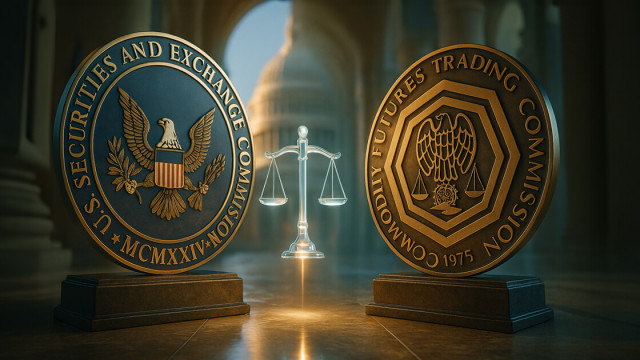
SEC vs CFTC Rematch Booked Over Who Polices US Crypto—and Your Coins
CryptoSlategeneral
Washington has long wrestled with who should police digital assets. The Digital Asset Market Clarity Act of 2025 passed the House this summer, but the Senate had not acted.
📋 Article Summary
The Ongoing Regulatory Tug-of-War Over Cryptocurrency Oversight
The longstanding jurisdictional dispute between the Securities and Exchange Commission (SEC) and the Commodity Futures Trading Commission (CFTC) over the regulation of digital assets in the United States has reached a new flashpoint. The proposed Digital Asset Market Clarity Act of 2025, which passed the House of Representatives earlier this summer, has yet to be taken up by the Senate, underscoring the continued uncertainty and complexity surrounding the regulatory framework for the burgeoning cryptocurrency industry.
At the heart of the matter is the fundamental question of whether cryptocurrencies and other digital assets should be classified as securities, which would fall under the SEC's purview, or as commodities, which would place them under the CFTC's regulatory authority. This distinction is more than just a bureaucratic technicality, as it would determine the rules and oversight that apply to the trading, custody, and disclosure requirements for these digital assets.
Cryptocurrency industry experts have long advocated for clear and consistent regulation, arguing that the current patchwork of regulatory oversight has created a compliance minefield that stifles innovation and leaves investors vulnerable. The lack of a definitive legislative solution has allowed the SEC and CFTC to engage in an ongoing battle for regulatory dominance, with each agency asserting its authority over various aspects of the crypto ecosystem.
The implications of this regulatory tug-of-war are significant for both individual investors and the broader crypto market. Absent a clear delineation of responsibilities, market participants face uncertainty and increased compliance costs, which can deter investment and stifle the development of new products and services. Moreover, the absence of a unified regulatory framework can leave investors exposed to potential fraud, manipulation, and other illicit activities, undermining confidence in the digital asset markets.
Looking ahead, industry analysts predict that the resolution of the SEC-CFTC jurisdictional dispute will be a critical factor in shaping the future of the cryptocurrency industry in the United States. A decisive legislative solution, such as the passage of the Digital Asset Market Clarity Act, could provide much-needed clarity and stability, paving the way for sustained growth and innovation. Alternatively, a continued standoff between the two regulatory agencies could perpetuate the current state of uncertainty, potentially driving crypto businesses and investment to more crypto-friendly jurisdictions overseas.
Ultimately, the outcome of this regulatory battle will have far-reaching implications for the millions of Americans who have embraced cryptocurrencies as a means of investment, transaction, and financial inclusion. The stakes are high, and the need for a cohesive and forward-looking regulatory approach has never been more pressing.